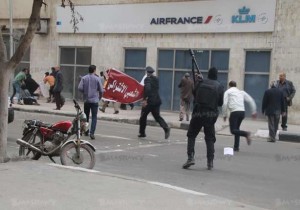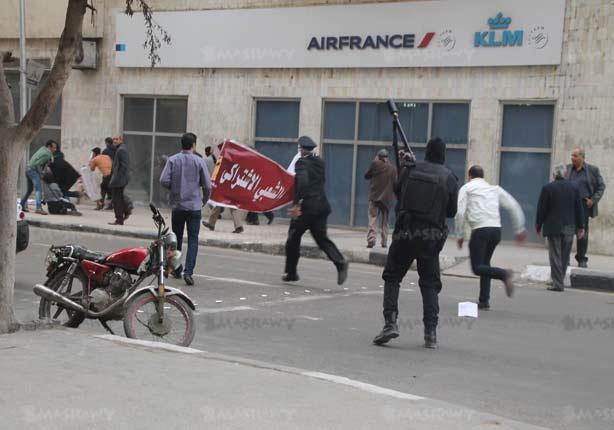 The undersigned organizations strongly condemn the extrajudicial killings of peaceful demonstrators carried out by Egyptian security forces on January 24 and 25, 2015. On January 24, 2015, human rights defender Shaimaa Sabri Ahmed al-Sabbagh, the grassroots outreach officer with the Socialist Popular Alliance Party in Alexandria, was killed by shots to the back fired by security forces. The shots tore the heart and lungs and caused heavy internal bleeding in the chest cavity, according to the autopsy report of the Zeinhom Forensic Medicine Authority. The incident occurred when security forces cleared a peaceful march by several party members with shotgun fire and tear gas. The march set out from the party headquarters in downtown Cairo and headed toward Tahrir Square, chanting for bread, freedom, and social justice and carrying wreaths to commemorate the martyrs of the January uprising. Security forces also arrested six party members and participants in the march. They were released pending investigations on their own recognizance the next day, having been officially charged (report no. 805/2015/Qasr al-Nil misdemeanor) with participation in a demonstration that infringed public security, the assault of security forces, assembly, demonstrating a show of force and threatening violence, and the possession of printed and written materials.
The undersigned organizations strongly condemn the extrajudicial killings of peaceful demonstrators carried out by Egyptian security forces on January 24 and 25, 2015. On January 24, 2015, human rights defender Shaimaa Sabri Ahmed al-Sabbagh, the grassroots outreach officer with the Socialist Popular Alliance Party in Alexandria, was killed by shots to the back fired by security forces. The shots tore the heart and lungs and caused heavy internal bleeding in the chest cavity, according to the autopsy report of the Zeinhom Forensic Medicine Authority. The incident occurred when security forces cleared a peaceful march by several party members with shotgun fire and tear gas. The march set out from the party headquarters in downtown Cairo and headed toward Tahrir Square, chanting for bread, freedom, and social justice and carrying wreaths to commemorate the martyrs of the January uprising. Security forces also arrested six party members and participants in the march. They were released pending investigations on their own recognizance the next day, having been officially charged (report no. 805/2015/Qasr al-Nil misdemeanor) with participation in a demonstration that infringed public security, the assault of security forces, assembly, demonstrating a show of force and threatening violence, and the possession of printed and written materials.
In another incident, lawyer and human rights defender Azza Soliman, the founder of the Center for Egyptian Women’s Legal Assistance and the chair of the organization’s board of trustees, sought to give her testimony about the incident. Though not taking part in the march, she was in the area at the time and witnessed the incident. In seeking to testify, Soliman was motivated by a desire to see justice done and accountability for those responsible for al-Sabbagh’s death. After waiting in the prosecution office for several hours, Soliman gave her testimony as an eyewitness. She was then shocked to find the Public Prosecution accusing her of assembly and participation in a demonstration that disturbed public security. Four other witnesses had the same experience; they were all charged after they came forward to give their testimony. The prosecution released all the charged witnesses pending investigation.
The prosecution initially questioned the witnesses orally, after which the chief prosecutor asked them to file a request to give their statements.
The witnesses then filed a complaint accusing the interior minister and the forces involved as having dispersed the peaceful assembly of the Socialist Popular Alliance Party.
On January 25, security forces also used excessive, lethal force against demonstrators in various areas of Cairo and Alexandria, particularly in the environs of Matariya Square. Eyewitnesses reported that after demonstrators reached the square, security forces began attacking them, spurring several demonstrators to declare a sit-in in the square. Security forces met this initiative with lethal force, setting loose armored personnel vehicles to chase citizens with tear gas and shotgun fire. Some residents reported that security forces used live ammunition in some narrow side streets. Dozens of demonstrators and ordinary citizens were killed and injured as a result, but the media blackout of the events, stopping the foreign press from filming, and the lack of official statements about it have made it difficult to determine the exact number of casualties and injuries. As midnight approached, an informal curfew was imposed on Matariya’s residents, who were prohibited from approaching the square, even on foot, in fear of unannounced shotgun fire.
Clashes and skirmishes continued throughout January 26 and 27, which led to the death and injury of several people, among them children. The situation in Matariya Square is still tense.
In this context, the undersigned organizations condemn the threats received by BBC correspondents while covering the Matariya events. The correspondents said that security personnel in civilian garb threatened to shoot them if they continued to film. The undersigned organizations also condemn the rapid escalation of violence and assaults seen on the fourth anniversary of the January revolution. We also reject turning Azza Soliman from a witness into a defendant. This action reflects the bias of the investigating authorities and is inconsistent with any established legal standards.
This use of violence by security forces during the January revolution anniversary is not the first of its kind. On the third anniversary of the uprising last year, at least 60 people were killed, most of them by live ammunition used by security forces to disperse demonstrations, and more than 1,000 demonstrators were arrested all over the country.
The undersigned organizations thus demand the following:
- An immediate, impartial, comprehensive investigation into the death of human rights defender Shaimaa al-Sabbagh and accountability and prosecution for those who caused her death; this investigation must be transparent, which entails an investigation into the involvement of police and state actors.
- An immediate investigation into police violations of Law 107/2013 on demonstrations and peaceful assembly and accountability for police personnel who violated Articles 11 and 12 of the law. The law requires police forces to adhere to the use of escalating force when dispersing illegal assemblies, which includes warning demonstrators and giving them a reasonable amount of time to respond prior to the dispersal. In addition, police must first use water, followed by tear gas, and then batons if demonstrators refuse to respond. The law only permits the use of gunfire (shotgun fire) if all previous methods fail or if demonstrators use violence. Gunfire must first be preceded by warning shots and then sound or smoke grenades; this may be followed by the use of rubber coated shotgun pellets and then non-rubber coated shotgun pellets. This procedure was not followed in the case of al-Sabbagh, according to the testimony of attorney Azza Soliman and other witnesses. On the contrary, there was a strong, rapid attack on the demonstrators with shotgun fire and tear gas.
- The dropping of the false charges against lawyer and human rights defender Azza Soliman and the other four witnesses and the issuance of an official, public apology.
- The launch of far-reaching investigations into all incidents and killings of demonstrators since the January 2011 revolution to the present day. This should be carried out by courts following a program of transitional justice and guarantee accountability for the real perpetrators of crimes, and the findings of these investigations should be released with full transparency.
Signatories
- Cairo Institute for Human Rights Studies
- Nazra for Feminist Studies
- Center for Egyptian Women’s Legal Assistance
- National Group for Human Rights and Law
- Human Rights Legal Aid Group
- Arabic Network for Human Rights Information
- Association for Freedom of Expression and of Thought
- Andalus Institute for Tolerance and Anti-Violence Studies
Share this Post

